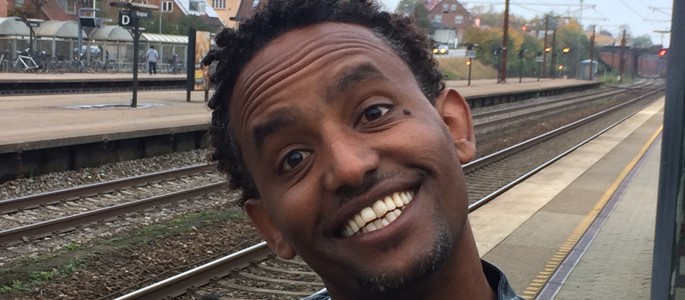Please don't introduce me as 'refugee'
Abel came to Denmark two years ago, and in spite of his exceptionally high level of activity, he has still not succeeded in finding a job
This is a portrait of a very special person, but it can illustrate some of the challenges that all refugees face when arriving in Denmark. I met Abel Zemhret Kidane shortly after his arrival two years ago, and a warm friendship quickly grew between us. The description is therefore not neutral at all, but the facts are correct.
NOTE May 2017: A few months after the article Abel managed to get a paid job in a store room, and he is now working as a verger in a Danish church in Nørrebo, Copenhagen.
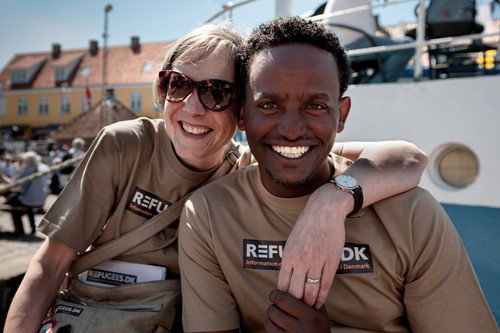
Abel and the author in Bornholm 2015
When I come to see Abel's one-room apartment in Ringsted for the first time, of course he stands ready on the platform of the station to greet me with a big hug, and he serves coffee with freshly sliced fruit and Danish pastry, followed by the traditional Eritrean injera, which is a special pancake with different sauces. Shamefully, I think of the dish with cookies that I put on the table last time he came to visit me. In spite of my budget for food being maybe ten times as high as his.
He smiles his bright, white smile while struggling to speak correct Danish. It turns out well, and in two weeks he is due for the final test in Danish, level 2. Then he will have one year of Danish language class behind him, deducting a few months break while in courses and internships. Afterwards, he wants to continue taking 9th grade at VUC. After half an hour I let him off the hook to continue in English, which he speaks fluently. It's better when you have to talk about difficult issues.
The modest helper
First time I met Abel, he came to get legal advice at Refugees Welcome in Trampoline House in Copenhagen, where I was on duty with an Eritrean interpreter. In spite of his good English, he preferred to speak his mother tongue Tigrinya, and talked nonstop for an hour – the interpreter only translated the most important parts. This was in November 2014, and like the other recently arrived 2,000 Eritreans, he was very nervous whether Denmark would grant him asylum.
Shortly after, I met Abel again in the asylum camp Avnstrup, where he had gathered all the around 100 Eritreans in the camp for the info meeting that I held with an interpreter. I told them about the infamous Danish report on Eritrea, and assured them that they would end up getting asylum in the end. Fortunately, I was right.
I soon realised that he was a kind of contact person and coordinator for his countrymen, though his modest personality would have forbidden him to say so. He helped voluntarily with translation and made sure that other residents got advice and support.
After a few weeks in the camp, he also started a small library for the asylum seekers with English books that he got cheap from local second hand shops.
As a devout catholic in the Eritrean, orthodox version, he became active in several church communities, among other Tværkulturelt Center in Copenhagen and the Eritrean congregation in Maria Kirke. He coordinated transport for the asylum seekers to the services in English in Roskilde Domkirke and organised bible readings in Tigrinya.
Besides, he started as an intern, writing stories and taking photos for New Times – a magazine written by asylum seekers and published by Danish Red Cross. They gave him a double page to describe his dramatic boat journey to Europe.
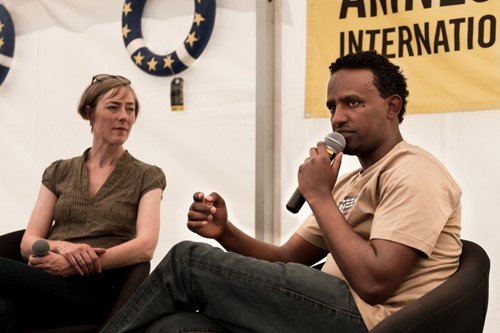
Amnesty focused on refugees at the Mediterranean Sea in Folkemødet 2015
Nightmare on the Mediterranean Sea
Since then, Abel has told me several times about his horrible journey, one time was when I interviewed him in Amnesty International's tent at Folkemødet, Bornholm, last summer. Tears were literally streaming down the cheeks of several people in the audience when he told about what happened. He left Libya together with 317 other refugees from Eritrea, squeezed together in an open wooden boat, about 10 metres long, and ended up spending 5 days on the open sea. In the harbour of Allinge, he showed me a boat of the same size, and I stood on the deck of the charming Danish boat, and could not in any way imagine 318 people onboard. Read his own story here.
To get to Bornholm, we had to sail, and though the large, modern catamaran ferry on a summer day in the Baltic Sea is very far from a smuggling vessel between Libya and Sicily, it took courage for him to make the trip. The sight of open sea and waves is forever connected to the fear and the experiences that the rest of us can't even imagine.
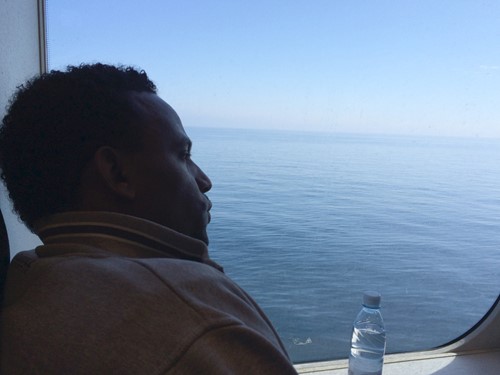
From Sicily, he continued up through Europe, and one day in September 2014, he was caught by the Danish police on the train with 5-6 other Eritreans. The others were on their way to Sweden, and the police had to use force to take their fingerprints. But Abel had reached his destination and followed willingly.
For all the ones who did not survive
TV stations and newspapers found Abel, when the focus was on Eritrea and the drowning refugees. He explained patiently many times that Eritrea is a dictatorship with lifelong military service, and that the terrors of the Sahara desert and the Mediterranean Sea is not something people would expose themselves and their children to, if it was possible to stay in their own country.
Danish Red Cross also noticed his special qualities, and he was on stage every time at the 'Humanitarian People's Meetings' that Red Cross arranged in four Danish cities in 2015, with a final conference in Copenhagen.
One day, we were on our way home on the train from a presentation we had done together at a folk high school, and I asked him if it wasn't too hard on him to tell about his terrible experiences again and again? He answered: "This is the only thing I can do for all the people who did not survive."
Denmark and the Danes
Was Denmark the smart choice after all? Every day he listens to politicians on TV, speaking about refugees as criminals, terrorists and expenses, making it clear that people like him are unwanted. He feels like shouting: 'We are humans like you! We can do things, we can contribute!'
But he is happy for all the help and support and love he personally has been met with. "All the furniture, every single thing you see in this flat, was given to me by local Danes," he says. And he points to the paradox that several members from the local branch of Venligboerne in Ringsted used to vote for the nationalist Danish People's Party.
"I admire the Danish society and all Danes – they have made me defeat all my trauma and the problems I have faced. And especially in the Christian communities I have immediately felt very welcome and at home. I particularly admire all the Danes who are fighting for us and our rights."
Two women have a special place in his heart: Hanne Vedsted-Hansen for taking Abel into her family, and Merete Løvgren for practicing Danish with him and another Eritrean at home.
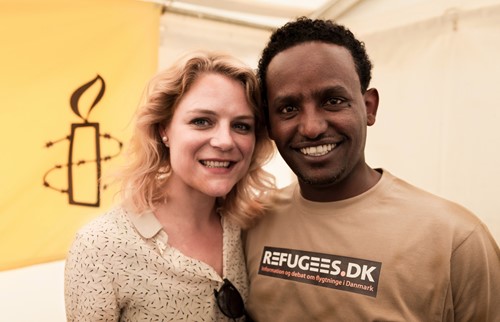
Abel with Danish politician Johanne Schmidt-Nielsen at Folkemødet
However, not everyone has a positive attitude. Shortly after Abel moved into his small flat, his neighbour put up a notice that he was going to have a birthday party, apologizing for any noise. The next day, Abel bought a bouquet of flowers for 350 DKR and knocked on the neighbour's door. When nobody opened, he put it on his doormat with a note in Danish: "Congratulations on your birthday, kind regards from your neighbour Abel". Later that day, the bouquet had been placed on the stairs, and the neighbour is still not greeting Abel when they happen to meet.
Of course, this makes Abel sad, but he understands these reactions. If people only get their information from the newspapers and TV, it's natural that they get scared of foreigners. "Politicians are using refugees to take focus away from the real problems, which they can't solve. It's so easy to blame refugees for cutting down, and accusing them of anything," he says.
"Even my good friends introduce me as 'Abel, refugee from Eritrea.' They don't mean anything bad by that. But I hate being labelled as a refugee – I don't need the sympathy or special treatment, I just want to be a human being like everybody else."
Voluntary work, internships and job
Abel has been in constant activity, ever since he arrived, and he already has a large network. In March 2015 he was granted asylum, and Immigration Service decided he should stay in Ringsted municipality. There was no space until May, and even then he spent the first ten months in temporary accommodation – a former asylum camp where 28 refugees with residence permit were now placed, most of them from Eritrea. The rooms were worn down, small and miserable, with one shared kitchen, two stoves for cooking and one washing machine for all the residents.
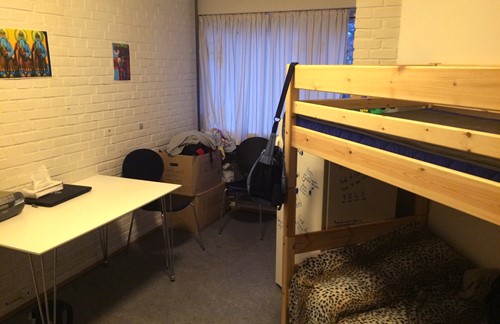
From the temporary place in Ringsted
Very soon, Abel and some other guys got a refugee football team together (in the beginning they were not allowed to use the local football field, but now the team is sponsored by a local company) and had found some neighbours who would like to help with practical issues and the difficult Danish language. Abel became a volunteer in the second hand shop of DanMission in town, with the elderly ladies, and he got a three months internship in the integration office of the municipality.
Abel's greatest wish is to get a job and be able to support himself economically – he will do any kind of work. He has knocked on all the doors in Ringsted to be hired, at least for a trial period, in vain. He participated in a TV program on DR (national TV) called 'Asger and the new Danes', where the finance celebrity Asger Aamund wanted to show that refugees could find jobs, if they really wanted to. When Mr. Aamund heard that Abel had once done some welding, the municipality gave him an expensive welding course – unfortunately a kind of welding which is hardly used anymore, so that was useless.
Through friends, he found an internship as a waiter in a new restaurant in Copenhagen, where he happily laboured every day, more than full time, for three months. But again, it did not lead to a paid job, so now he will be starting another internship at an electronics company in Ringsted.
In Eritrea, Abel studied philosophy at the university in the capital Asmara, and theology on the side, and he worked in a government office. For 5-6 years he volunteered in a youth counselling for HIV-infected people, and he took a course in health and preventive action given by Norwegian Church Aid. The Danish job centre has not tried to build on any of this.
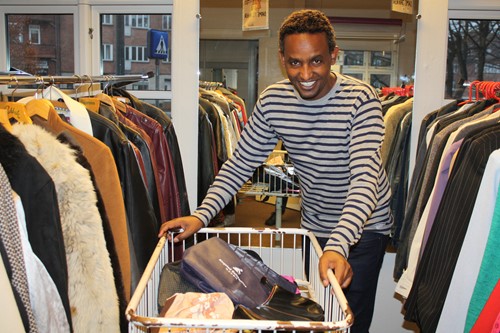
DanMission's shop. Photo: Birthe Munck-Fairwood, Tværkulturelt Center
Economy
As an asylum seeker, Abel got 1,200 DKR every second week, for food, transport etc. The first couple of months in his municipality, he got 'kontanthjælp' (normal allowance) and it was cheap to stay in the temporary place. Since the 'integration allowance' was introduced in August 2015 (newcomers are now getting half of what others get), he only gets 6.100 before tax. In the temporary flat he still had 2,900 DKR left when the rent was paid, and there was a shared internet connection. But six months ago he was offered a real apartment, a nice little one-room with balcony, 10 minutes walk from the station. The rent is very fair; 3,100 DKR per month incl. heating and electricity, but after tax, rent and media license, there is only 1,700 left for everything else: food, transport, phone, internet, clothes, shoes, dentist…
I ask Abel how on earth this is impossible? Even in my poorest days on SU (student's grant) I had quite a bit more to spend, plus a family standing by to help with tickets, food etc. and to make sure that winter boots, bicycle and things like that were given as Christmas or birthday presents. He says, he has decided to sell the nice TV that a friend has given to him, to avoid the media license.
He does not have internet connection in the flat, and by the way, his laptop was stolen. Every single day he takes his old ladies' bicycle to the local library, where he spends 2-3 hours on the computer applying for jobs and sending his CV out on Jobnet (public Danish job centre website). On his mobile he uses phone cards. He has gotten used to only eating twice a day, and spends as much time as possible away from home – then he doesn't think about food so much. He no longer goes to church in Copenhagen on Sundays, because the train ticket is far too expensive. Every month he tries to put aside 200 DKR for larger expenses like dentist. I'm quietly thinking that a dentist bill will easily run up to 5,000 DKR…
Abel doesn't expect anything from others, and he never asks for help. I managed to make him accept gift cards and put money into his Rejsekort (travel card), when he took part in debates, presentations, translation etc. But he would never accept anything if it wasn't a kind of payment for a service.
Family members in the home country are a problem for most refugees. "Of course they are relieved that we are safe now and live in freedom. But Eritrea is also a poor country, and they think we have loads of money here. It makes me miserable that I'm not able to help them, and that they don't believe how little I have for myself," he tells. Many refugees are also shocked to realise how hard it is to find a job here, even if you are not choosy.
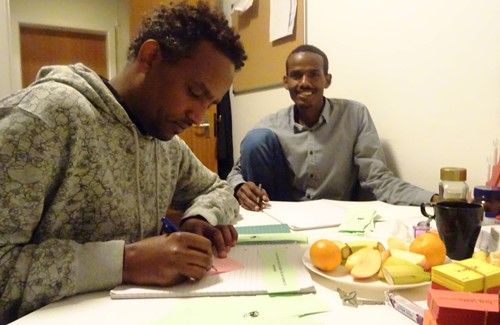
Abel and a friend practice Danish with Sproggren-systemet
Why is it hard to find a job?
Besides becoming self-supporting, Abel's plan is to continue his university studies – he applied to get into Africa Studies, and he is waiting to hear if he made it. In spite of his municipal caseworker recently telling him that with his 33 years, he is too old to get an education!
About his dreams for the future, he says: "In the long run, I want to be able to help others, especially my countrymen who have gone through so much hardship. They need to have their horizons widened and understand that we have lived in a dysfunctional, totalitarian system, but now we have come to a healthy society where education and initiative pays off." He is sorry that so many Eritreans are passive and expectant when they come here. "And though I love Venligboerne (an integration movement), they are also keeping us in the passive role – they want to babysit us," he says with a big smile.
To me, it is a mystery that nobody has hired him yet: energetic, charming, intelligent and enterprising as he is. So I ask him, what is wrong with the Danish system?
"We are facing an institutionalisation, which makes us helpless. At the same time, we are met with negative expectations; the state treats us almost like criminals. You have to evaluate the experiments and ask the refugees themselves, what they think. The municipality must be the connection to the private businesses and make sure that internships actually lead to job contracts. When refugees are working 8 hours a day without getting one penny for it, and every three months you just start in a new company, then it is slavery. We are being squeezed between the private businesses which exploit us, and the state which is trying to crush us," Abel explains.
"There should be courses in practical skills combined with language school, resulting in a certificate or diploma, that we can use to ask for jobs. The new basic 2-year education is a good idea, but it hasn't started at all yet."
Abel thinks the municipalities are doing a lot of things that are not working. For instance, a stay in a folk high school has no effect, if you are put in a class with a lot of others from your home country. One of his friends are in 'language school-internship' – he works five days a week fulltime in a warehouse with some Polish workers, and then one day of language school; obviously he will learn nothing from that
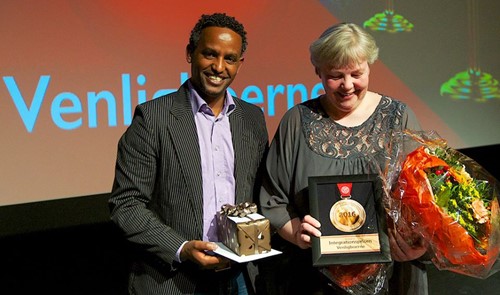
In 2015 Abel was granted the integration award of the year from Tværkulturelt Center, presented by Chief Rabbi Bent Melchior, and in 2016 he received Ringsted Integration Award together with Venligboerne (photo).


